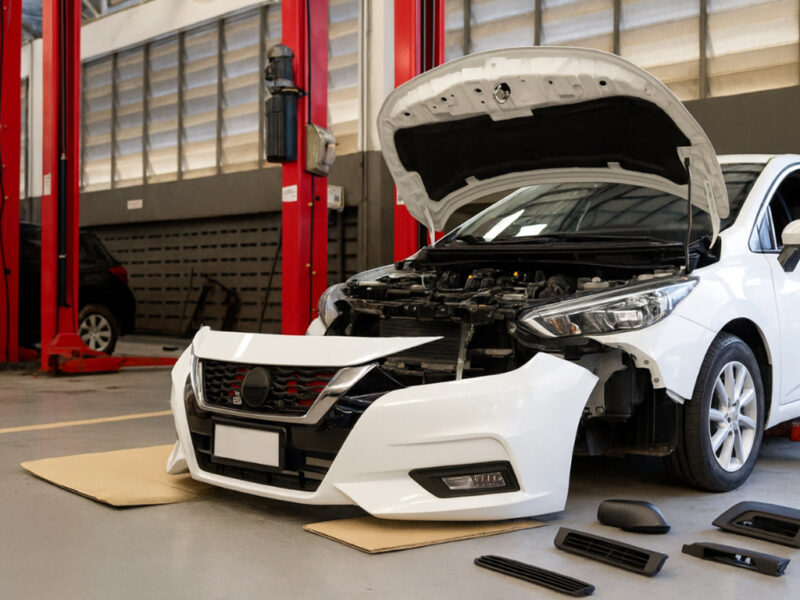
Automotive plastic component manufacturing is the process of producing parts in plastic according to technical drawings or specific use requirements. These parts help reduce vehicle weight and save fuel while still ensuring durability, safety, and aesthetics. This is a key solution in the modern automotive industry.
The role of plastic components and accessories in automobiles
On a modern car, plastics account for more than 60% of the number of individual parts. Replacing metal with plastic not only reduces weight but also improves energy absorption, limiting damage in collisions. Common applications include:
- Front and rear bumpers, engine covers/undertrays.
- Dashboard, instrument cluster, interior trim panels.
- Headlights, windshield, mirror housings.
- Hood, trunk lid, transmission housing/cover, air-filter housing.
- Technical components such as couplings, small gears, and fuel-system parts.
- Door handles, steering-wheel trim, HVAC vents.
- Headliner and floor trims, storage compartments, and cup holders.
- Fuse-box housings, electrical enclosures, and insulating components.
- Fluid lines and air ducts within the engine system.

Quality standards in manufacturing plastic automotive components
Plastic auto parts must comply with stringent standards for safety and durability. Businesses should pay attention to the following:
- International standards: Automotive plastic components typically need certifications such as ISO 9001 and OEM standards from automakers.
- Mechanical strength: Exterior parts must be tested for impact resistance and durability under harsh weather conditions.
- Heat resistance: Materials must remain stable at high temperatures in the engine bay or during outdoor use.
- UV and scratch resistance: Interior and exterior surfaces should retain color without fading or cracking over time.
- Health and safety: Interior plastics should be non-toxic, low-odor, and environmentally friendly.
Plastics used for manufacturing automotive components and accessories
Each group of automotive parts uses specific plastics to ensure durability, safety, and appearance. For exterior parts, PP and ABS are used for bumpers, side trims, and mirror housings thanks to their impact resistance and paintability. For interiors, ABS and PS are suitable for dashboards, buttons, and HVAC vents. PUR is used for seats and acoustic insulation due to its high elasticity. For technical parts requiring stiffness and precision, POM engineering plastic and PA are common choices for gears, couplings, bearings, and similar components.
Material selection typically starts with analyzing part requirements, comparing resin properties, prototyping on small samples, and finally selecting the optimal material for mass production. This approach ensures quality while controlling costs in automotive component manufacturing.

Manufacturing methods for plastic automotive components
Depending on the part, manufacturers should choose an appropriate method to ensure accuracy, volume, and optimal cost. Common technologies include:
- Injection molding: Suitable for large interior and exterior parts such as bumpers, dashboards, and door trims. Advantages include high precision and cost-effective mass production.
- Compression molding: Used for larger or load-bearing components such as hoods and engine shields. The plastic is compressed in the mold, yielding high stiffness and mechanical strength.
- Blow molding: Ideal for hollow products like washer reservoirs, fuel tanks, and air ducts-lightweight, durable, and leak-tight.
- CNC machining: Common in prototyping or low-volume builds, especially for technical parts like plastic gears or couplings requiring extreme precision.
Automotive plastic component manufacturing at Thai Duong Plastics
With many years of experience in industrial plastic molding, Thai Duong Plastics provides end-to-end solutions for manufacturing plastic components and accessories for the automotive sector. We operate modern machinery, advanced processing technologies, and a skilled engineering team to ensure products meet high technical and durability standards.

Thai Duong Plastics commitments:
- Products built to drawing and exact technical requirements.
- High-quality, safe plastics with clear provenance.
- Stringently controlled production processes to minimize defects.
- Fast delivery, competitive costs, and flexible cooperation policies.
- Design and material-selection support from the outset.
- Capability to handle both large orders and small runs/prototypes.
- Clear warranty policies and ongoing customer support in service.
If you need manufacturing for plastic automotive components and accessories, please contact Thai Duong Plastics for detailed consulting and a tailored quotation.
Details: Information on injection molding of filled and unfilled Nylon
